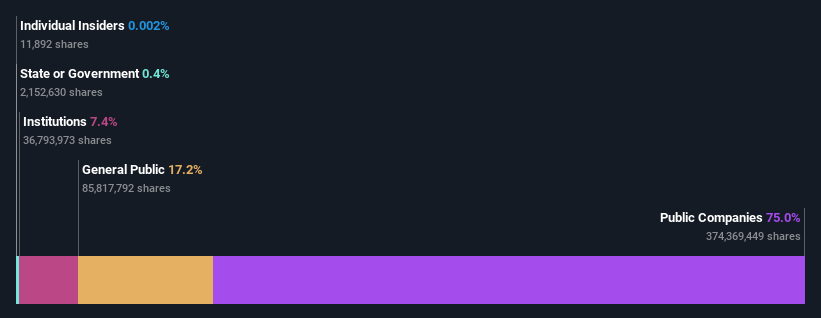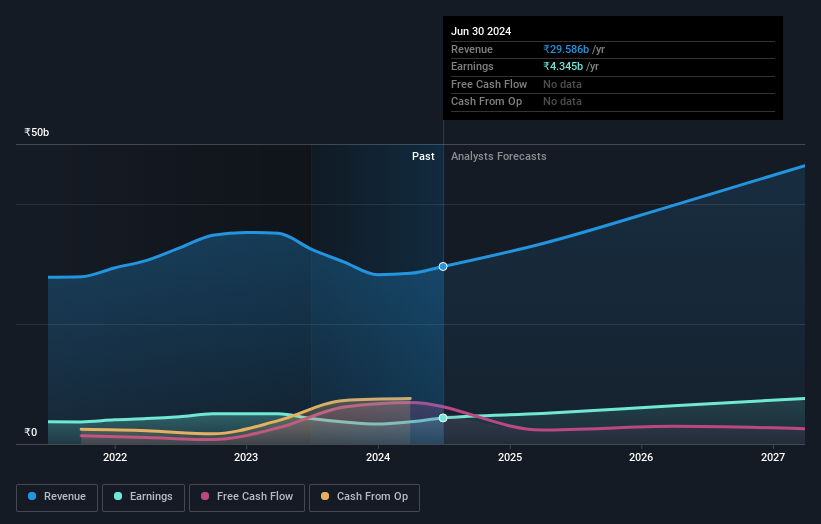Public companies invested in Sumitomo Chemical India Limited (NSE:SUMICHEM) copped the brunt of last week's ₹18b market cap decline

Key Insights
- Sumitomo Chemical India's significant public companies ownership suggests that the key decisions are influenced by shareholders from the larger public
- The largest shareholder of the company is Sumitomo Chemical Company, Limited with a 75% stake
- Analyst forecasts along with ownership data serve to give a strong idea about prospects for a business
To get a sense of who is truly in control of Sumitomo Chemical India Limited (NSE:SUMICHEM), it is important to understand the ownership structure of the business. The group holding the most number of shares in the company, around 75% to be precise, is public companies. Put another way, the group faces the maximum upside potential (or downside risk).
As market cap fell to ₹260b last week, public companies would have faced the highest losses than any other shareholder groups of the company.
Let's take a closer look to see what the different types of shareholders can tell us about Sumitomo Chemical India.
View our latest analysis for Sumitomo Chemical India

What Does The Institutional Ownership Tell Us About Sumitomo Chemical India?
Institutions typically measure themselves against a benchmark when reporting to their own investors, so they often become more enthusiastic about a stock once it's included in a major index. We would expect most companies to have some institutions on the register, especially if they are growing.
As you can see, institutional investors have a fair amount of stake in Sumitomo Chemical India. This implies the analysts working for those institutions have looked at the stock and they like it. But just like anyone else, they could be wrong. If multiple institutions change their view on a stock at the same time, you could see the share price drop fast. It's therefore worth looking at Sumitomo Chemical India's earnings history below. Of course, the future is what really matters.

Sumitomo Chemical India is not owned by hedge funds. Looking at our data, we can see that the largest shareholder is Sumitomo Chemical Company, Limited with 75% of shares outstanding. This implies that they have majority interest control of the future of the company. For context, the second largest shareholder holds about 1.1% of the shares outstanding, followed by an ownership of 1.0% by the third-largest shareholder.
While it makes sense to study institutional ownership data for a company, it also makes sense to study analyst sentiments to know which way the wind is blowing. Quite a few analysts cover the stock, so you could look into forecast growth quite easily.
Insider Ownership Of Sumitomo Chemical India
While the precise definition of an insider can be subjective, almost everyone considers board members to be insiders. Management ultimately answers to the board. However, it is not uncommon for managers to be executive board members, especially if they are a founder or the CEO.
Insider ownership is positive when it signals leadership are thinking like the true owners of the company. However, high insider ownership can also give immense power to a small group within the company. This can be negative in some circumstances.
Our most recent data indicates that insiders own less than 1% of Sumitomo Chemical India Limited. Keep in mind that it's a big company, and the insiders own ₹6.2m worth of shares. The absolute value might be more important than the proportional share. Arguably, recent buying and selling is just as important to consider. You can click here to see if insiders have been buying or selling.
General Public Ownership
The general public-- including retail investors -- own 17% stake in the company, and hence can't easily be ignored. While this group can't necessarily call the shots, it can certainly have a real influence on how the company is run.
Public Company Ownership
Public companies currently own 75% of Sumitomo Chemical India stock. This may be a strategic interest and the two companies may have related business interests. It could be that they have de-merged. This holding is probably worth investigating further.
Next Steps:
It's always worth thinking about the different groups who own shares in a company. But to understand Sumitomo Chemical India better, we need to consider many other factors.
I always like to check for a history of revenue growth. You can too, by accessing this free chart of historic revenue and earnings in this detailed graph.
If you would prefer discover what analysts are predicting in terms of future growth, do not miss this free report on analyst forecasts.
NB: Figures in this article are calculated using data from the last twelve months, which refer to the 12-month period ending on the last date of the month the financial statement is dated. This may not be consistent with full year annual report figures.
New: Manage All Your Stock Portfolios in One Place
We've created the ultimate portfolio companion for stock investors, and it's free.
• Connect an unlimited number of Portfolios and see your total in one currency
• Be alerted to new Warning Signs or Risks via email or mobile
• Track the Fair Value of your stocks
Have feedback on this article? Concerned about the content? Get in touch with us directly. Alternatively, email editorial-team (at) simplywallst.com.
This article by Simply Wall St is general in nature. We provide commentary based on historical data and analyst forecasts only using an unbiased methodology and our articles are not intended to be financial advice. It does not constitute a recommendation to buy or sell any stock, and does not take account of your objectives, or your financial situation. We aim to bring you long-term focused analysis driven by fundamental data. Note that our analysis may not factor in the latest price-sensitive company announcements or qualitative material. Simply Wall St has no position in any stocks mentioned.
About NSEI:SUMICHEM
Sumitomo Chemical India
Engages in the manufacture and sale of household and public health insecticides, agricultural pesticides, and animal nutrition products in India and internationally.
Flawless balance sheet with solid track record.


